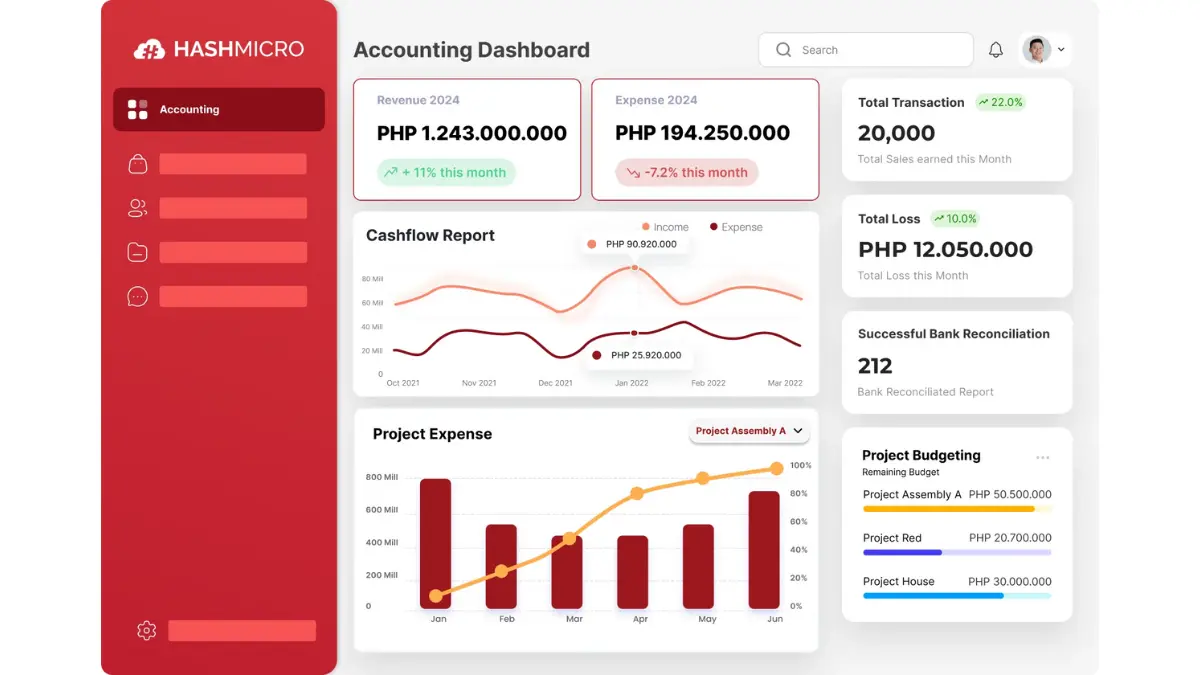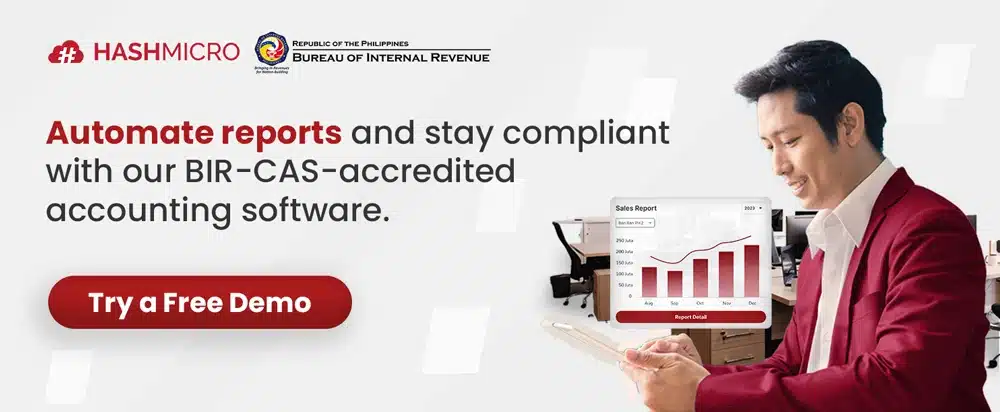Have you ever looked at your business bank balance and thought everything was fine, only to get caught off guard by unpaid bills or delayed revenue? That’s a common pitfall for businesses using cash basis accounting.
Because it records only actual cash movement, cash-based accounting can leave out critical data like unpaid invoices or upcoming liabilities. This can mislead managers about their business’s true financial health.
In the Philippines, Department of Trade and Industry (DTI) guidelines encourage small business owners to adopt clearer financial practices as they scale. This often includes transitioning from simplified systems like cash basis to accrual-based methods for better financial visibility.
Read on to discover the pros and cons of cash basis accounting, and how to decide if it’s still the right fit. We’ll also share practical tips and software recommendations to support your accounting journey.
Table of Contents

Key Takeaways
|
What is Cash Basis Accounting?
Cash basis accounting, also known as cash-based accounting, is a simple and practical method used by many small businesses in the Philippines. Under this system, income is only recorded when cash is actually received, and expenses are only recognized when they are paid, making it easy to track real-time cash flow without dealing with accounts receivable or payable.
This method is particularly suitable for businesses that operate primarily on a cash-to-cash basis, such as freelancers, consultants, or small retail stores. Since income from credit transactions is not recorded until payment is received, it provides a clear picture of how much money is truly available in the business at any given time.
However, while cash basis accounting offers ease and clarity, it may not reflect the full financial position of a growing business. It can also present limitations in tax reporting and financial planning, especially when a business needs to transition from cash basis to accrual accounting to meet regulatory or investor requirements.
Who Uses Cash Basis Accounting in Business?
In the Philippines, cash basis accounting is widely used by sole proprietors, freelancers, micro-businesses, and small partnerships without corporate partners. This method is particularly suited for businesses that operate mainly in cash, such as local vendors, food stalls, and service-based professionals.
The appeal of cash based accounting lies in its simplicity—it records transactions only when cash is received or paid, making it easy to track real income and expenses. For businesses with steady cash flow and minimal financial complexity, this approach reduces errors, avoids the burden of managing receivables and payables, and streamlines bookkeeping without needing a full-time finance team.
Additionally, entrepreneurs managing multiple businesses have the flexibility to choose between cash basis or accrual accounting based on each entity’s needs. Selecting the most appropriate method is essential for maintaining accurate financial records and supporting informed business decisions in a competitive and fast-moving market.
How does Cash Basis Accounting Work for Business?
Cash basis accounting works by recording transactions only when cash is actually received or paid out. For instance, if a business issues an invoice in March but receives payment in April, the income is recognized in April—making it easier to manage for firms operating on a cash to cash basis.
This approach also applies to expenses: they are only recorded when payment is made, not when the bill is received. A common example is when a sari-sari store owner buys supplies on credit in one month but pays the bill the following month. Under cash based accounting, the expense appears only when the payment is made.
While this method offers simplicity and clear visibility into cash flow, it doesn’t reflect pending revenues or unpaid expenses. Businesses like small retail shops or service providers may find cash basis accounting useful for day-to-day operations, but they should be aware it may not give a full picture of financial health without tracking receivables and payables.
What are the Pros and Cons of Cash Basis Accounting?
For businesses in the Philippines, choosing the right accounting method can greatly influence how financial performance is measured and understood. Below are the key advantages and disadvantages of using cash basis accounting, especially for small or cash to cash basis businesses.
Pros of Cash Basis Accounting
- Simple to use and understand: Cash based accounting is straightforward and ideal for freelancers, sole proprietors, and small businesses with uncomplicated finances. Its simplicity reduces the need for in-depth accounting knowledge or external consultants.
- Real-time cash flow visibility: Since this method tracks money as it’s received or spent, business owners always know exactly how much cash is available. This real-time clarity is especially useful for managing day-to-day operations in cash-driven businesses.
- Better tax management: With cash basis accounting, taxes are only paid on income that’s actually been received. This flexibility helps Filipino businesses manage their tax liabilities more efficiently, especially during lean months.
- Lower administrative burden: Cash basis requires less paperwork, fewer entries, and simpler tracking tools compared to accrual systems. This makes it cost-effective and time-saving, particularly for microenterprises or startups.
Cons of Cash Basis Accounting
- Incomplete financial picture: Because it excludes accounts receivable and payable, cash basis accounting may distort the real financial condition. A business might seem profitable when it’s not—or vice versa.
- Timing mismatches: Income and related expenses may fall in different periods, making it harder to assess actual profitability. For example, recording a large expense in one month but the matching revenue in the next can confuse decision-makers.
- Not GAAP-compliant: Cash based accounting doesn’t meet Generally Accepted Accounting Principles, which are required for larger corporations or businesses seeking investors. This limits its use as businesses scale or need to comply with stricter regulations.
- Limited long-term insight: Without visibility into future income or liabilities, business planning becomes reactive instead of strategic. It’s harder to forecast trends, evaluate growth, or make informed investment decisions under a cash to cash basis model.
Drawbacks in Cash Basis Accounting
One of the main drawbacks of cash basis accounting for businesses in the Philippines is its potential to misrepresent financial health. If a business owner records expenses like salaries and utilities without recognizing all pending income, it can create the impression of poor cash flow—making it harder to secure credit or financial support.
Conversely, the business may appear cash rich during periods with minimal expenses, even though unpaid obligations exist. This false sense of financial strength can lead to poor decisions, such as increasing personal withdrawals or reinvesting in areas the business can’t actually afford under a cash to cash basis model.
Because of these risks, cash based accounting can create challenges when seeking investors or loans, as it doesn’t reflect true profitability or liabilities. Many Philippine businesses looking for long-term growth eventually transition to accrual accounting for a more reliable view of performance and better financial transparency.
When is Cash Basis Accounting a Good Fit?
For many businesses in the Philippines, especially those still growing or operating on a small scale, cash basis accounting offers a simple yet effective way to manage finances. Below are specific situations where this method is most appropriate, helping business owners make smarter choices in line with their operational needs.
- Small businesses with simple transactions: Cash based accounting is ideal for small enterprises and sole proprietors who don’t deal with complex transactions or large inventories. It keeps the process manageable and helps owners stay focused on daily cash flow rather than long-term financial forecasting.
- Retailers and service providers paid upon sale: Businesses that operate on a cash to cash basis—such as sari-sari stores, local retailers, or small clinics—benefit from recognizing income only when payment is received. This ensures accurate visibility of available funds without the complication of accounts receivable.
- Freelancers and startups in early stages: Freelancers, consultants, and startups just beginning their journey often prefer cash basis accounting for its simplicity. It reduces administrative overhead while offering full control over cash inflows and outflows.
Enterprises not bound by GAAP requirements: In contrast to larger corporations that must follow stricter standards, Philippine businesses that aren’t required to adopt accrual accounting can freely choose the cash based method. This flexibility allows owners to align their bookkeeping with real-time business activity.
When Cash Basis Might Not Suit Your Business
While cash basis accounting can be helpful for many small businesses in the Philippines, it isn’t always the best fit, especially for companies with more complex financial needs. Below are several scenarios where cash based accounting may fall short and switching to accrual may be a smarter move.
1. You manage large inventories
Businesses that buy and sell significant amounts of stock may struggle with cash basis because it doesn’t track inventory accounting accurately. Without visibility into what’s earned or owed, it becomes harder to manage restocking and calculate profit margins effectively.
2. You offer credit terms to customers
If you allow customers to pay at a later date, using a cash to cash basis can delay revenue recognition and distort your true income. This makes it difficult to assess actual sales performance and could mislead future planning.
3. You have complex financial obligations
Companies with recurring payables, long-term contracts, or multiple business streams may find cash based accounting too simplistic. It doesn’t account for upcoming liabilities or income, which may result in poor financial forecasting.
4. You’re seeking external funding or investors
Potential investors or lenders typically prefer accurate financial reports based on accrual accounting. Using cash basis accounting can raise concerns about transparency and the reliability of your business’s financial health.
5. You want deeper financial insights
If your business is growing and you need to analyze profitability beyond just bank balances, cash basis may limit your strategic view. Accrual accounting offers a more comprehensive picture of financial performance over time.
How does Cash-Based Accounting Affect Tax Reporting?
Cash basis accounting offers a practical and straightforward approach to managing tax obligations. By recognizing income and expenses only when money changes hands, this method provides flexibility in how and when taxes are reported.
Here’s how cash based accounting influences your tax reporting process in a cash to cash basis operation:
1. Income recognition aligned with cash received
Under cash basis accounting, you only report income when the payment is actually received—not when an invoice is issued. This means if you provide services in December but get paid in January, that income is reported for the new tax year.
This setup helps businesses better match tax reporting with real cash flow. It’s especially helpful for small businesses and freelancers who want to avoid tax liabilities on unpaid earnings.
2. Expense deductions only when paid
You can only deduct expenses in the year you pay them, not when you receive the bill. For example, if you receive an invoice for marketing services in December but pay it in January, the deduction applies to the next tax period.
This approach prevents early deductions on unpaid obligations and keeps your financial records aligned with actual bank transactions. As a result, it simplifies compliance with local tax accounting rules.
3. Strategic timing for tax optimization
One of the key benefits of using cash based accounting is the control it gives over tax timing. You can delay sending invoices or postpone payments to manage taxable income across tax years.
For instance, pushing a client payment to January can reduce this year’s taxable income. This kind of flexibility helps Philippine business owners make smart year-end tax planning decisions.
4. Simplified tax filing process
Because cash basis accounting follows actual cash movements, tax filing becomes easier and less time-consuming. You won’t need to calculate or track accounts receivable and accounts payable, which simplifies your year-end reporting.
For entrepreneurs operating on a cash to cash basis, this can significantly reduce errors and bookkeeping stress. It also helps maintain transparency and consistency with your financial statements
How Can Businesses Transition from Cash-Based to Accrual Accounting?
As your business in the Philippines grows beyond the simplicity of cash basis accounting, switching to accrual accounting becomes a strategic step. Whether it’s due to investor requirements, tax compliance, or a need for better financial visibility, this shift allows you to move from a cash to cash basis mindset to a more comprehensive view of business performance.
Here’s how to make a smooth transition:
- Prepare and review existing records: Before switching, make sure your cash based accounting records are accurate and up to date. This gives you a clean foundation to build your new accrual system and helps avoid errors during conversion.
- Set up an opening balance sheet: You’ll need to establish key components like accounts receivable, accounts payable, prepaid expenses, and unearned revenue. These elements form the backbone of accrual accounting and give a clearer snapshot of what your business truly owns and owes.
- Upgrade to accrual-friendly tools: Most modern accounting system supports accrual entries, but you may need to reconfigure your system. If you’re still using manual methods under cash basis, this is the right time to move to a digital solution that can handle more complex workflows.
- Consult with an accounting professional: An accountant can guide you through the transition, helping you restructure reports and manage any tax implications. Their expertise is especially useful if your business is scaling or dealing with multiple income sources.
- Revisit your tax strategy: Switching from cash basis accounting to accrual may shift when income and expenses are reported for tax purposes. To avoid surprises, work closely with a tax advisor to understand how this affects your liabilities.
- Train your finance team: If you have staff handling your books, ensure they’re trained in the new system. They’ll need to understand how to track receivables, payables, and deferred income accurately.
- Inform stakeholders about the change: Let investors, lenders, and other financial partners know you’re transitioning from cash basis to accrual accounting. This improves transparency and builds trust by showing your commitment to better financial management.
Simplify Your Cash Basis Accounting with HashMicro’s All-in-One Solution
HashMicro is a leading provider of comprehensive accounting software in Philippines and Southeast Asia, designed to support businesses that operate on a cash basis accounting model. Through its integrated ERP system, HashMicro simplifies the recording of income and expenses based on actual cash flow—ensuring accuracy, compliance, and operational efficiency for businesses managing real-time transactions.
If you’re looking to streamline your cash to cash basis processes and reduce manual errors, why not book a free demo with HashMicro today? You’ll discover how the system automates income and expense recognition, improves financial visibility, and simplifies tax reporting—all while staying aligned with your daily operations.
Why do we recommend HashMicro? Its intuitive interface, proven performance, and dedicated local support make it the ideal software for managing cash based accounting efficiently. Trusted by numerous businesses across Southeast Asia, HashMicro empowers financial teams to track cash movement, control spending, manage accounting problems, and stay audit-ready with confidence.
Key Features of HashMicro’s Accounting Software:
- Real-Time Bank Integration: HashMicro connects directly with your bank accounts to ensure that every payment and receipt is recorded immediately—supporting accurate cash-based reconciliation and eliminating delays in financial reporting.
- Cash Flow-Oriented Invoicing with AR Collector: Manage collections efficiently with automated invoice tracking and follow-ups, enabling businesses on a cash basis to maintain a steady cash flow and reduce payment delays.
- Multi-Dimensional Reporting by Cash Position: Analyze branch, department, or project-level cash inflows and outflows to get a comprehensive view of your business’s liquidity and operational health—key to success for cash to cash basis operations.
- Accounts Payable Automation: Stay updated on vendor obligations and ensure timely disbursements, helping you maintain good supplier relationships while accurately reflecting cash outflows.
- Budgeting and Cash Forecasting Tools: Easily create budgets based on actual cash movement, track variances, and forecast future liquidity needs. These tools help businesses using cash basis accounting to plan more proactively and avoid shortfalls.
- Financial Statement Generation & Tax Compliance: Generate BIR-compliant reports, cash-based financial statements, and custom invoices aligned with your business format. Automated VAT and withholding calculations further ease the burden of tax reporting.
- Internal Controls & Matching for Cash Transactions: Utilize 3-way matching and automated validation to ensure every cash transaction is accurate and traceable—providing peace of mind and reducing fraud risks in high-volume cash environments.
Conclusion
Cash basis accounting offers a straightforward approach to tracking income and expenses, making it a popular choice for small businesses and sole proprietors in the Philippines. However, while it’s simple and easy to manage, it may not always provide the full financial picture needed for long-term planning and strategic growth.
To address these limitations, businesses can turn to HashMicro Accounting Software—a powerful solution designed to support both cash basis and accrual accounting needs. With features like automated cash tracking, real-time bank integration, BIR-compliant reporting, and advanced financial analysis, HashMicro ensures greater accuracy, compliance, and control over your finances.
Ready to take control of your accounting processes? Schedule a free demo with HashMicro today and experience how the right software can streamline your cash basis accounting and support smarter financial decisions for your business.




























